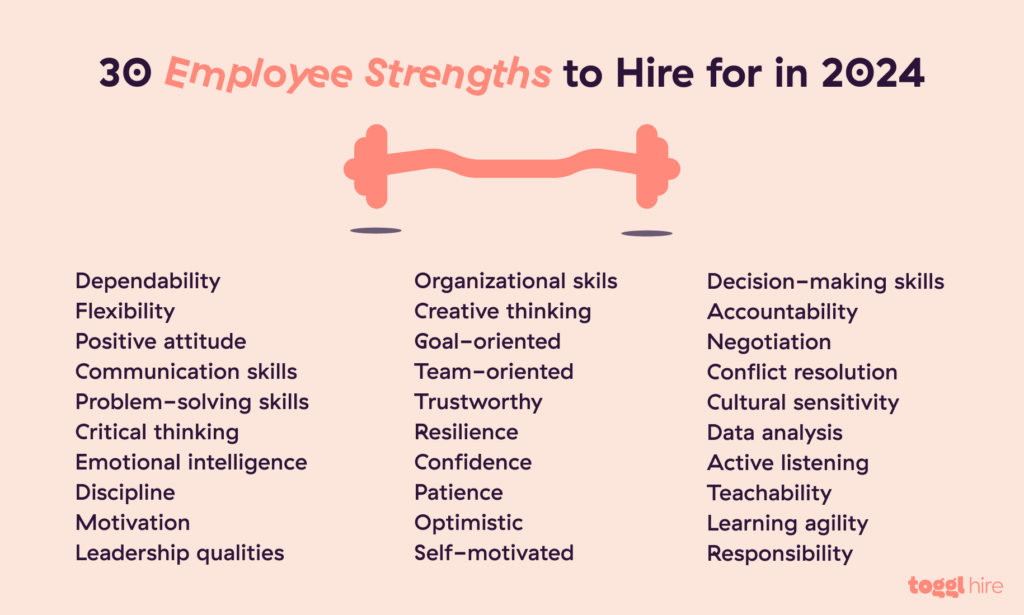When assessing candidates in job interviews, remember that your employee strengths are your organization’s strengths. Because think about it. That’s all organizations are. People. So if you want to build a dreamy company culture, look at your people first.
Whether you want to stand out in a competitive market, be known for wizard-like technical skills, or promote good work ethics, it all starts with your employees.
Unsure what to look for when assessing candidates (or your current workforce) for strengths and weaknesses? Use our list of 30 employee strengths to look out for and other helpful tips about why they’re important and how to assess them.
TL;DR — Key Takeaways
Employee strengths are characteristics that help them do their best work. They can be hard or soft job-related skills, but regardless, they fundamentally shape company culture.
Hiring for and developing key strengths is vital for employee job satisfaction and wider company performance. It’s important to stay on top of strengths and weaknesses in the workplace, as these will fluctuate with time and growth.
Some examples of employee strengths include leadership skills, time management, decision-making skills, teachability, and communication skills.
Strengths and weaknesses within the team sculpt hiring decisions and professional training resources you might offer and can help you enhance productivity internally and improve overall performance faster.
Assessing an employee’s strengths doesn’t have to be hard. With the right interview questions, a skills-testing tool like Toggl Hire, and regular performance reviews, building an employee strength strategy can be simple.

What are employee strengths?
Employee strengths are a broad category that encompasses both soft skills, like teamwork and decisiveness, and hard skills, like proficiency with a CRM system or SQL databases. Examples of key employee strengths can be emotional intelligence, problem-solving, or communication skills.
Ultimately, they’re a set of traits, talents, and characteristics that enable employees to do their job effectively.
Understanding your current employees’ strengths is vital to building a cohesive and effective company. This can help you organize teams by amplifying employee strengths and identifying employee weaknesses — then filling those gaps with new skills.
You can also address workplace weaknesses with new hires or training programs for personal and professional growth. For instance, if you know your current workforce isn’t very team-oriented, you might use that knowledge to hire a manager who has that strength.
30 crucial employee strengths
Different job-related skills will be more or less relevant depending on what industry you’re in, your business goals, and your team size. Every company’s needs are different.
It’s also important to remember that strengths in the workplace can manifest in many different ways. The key is to know what strengths are most important to your business and be able to identify them in the hiring process.
Now, let’s take a look at what some of those employee strengths might be for you.

1. Dependability
From meeting deadlines and quotas to taking responsibility for mistakes, you need team members you can depend on. In fact, dependability is more than just an employee strength — it’s a core characteristic that every member of your organization should possess.
Dependable employees can benefit the entire organization by breeding a culture of trust and autonomy.
2. Flexibility
If a deadline suddenly changes or the scope of a project grows, you need someone who can adapt — quickly and without complaining. This is the value of flexibility. Flexibility allows teams to solve problems more creatively, develop trust, and overcome obstacles faster.
This spirit of increased collaboration makes teams more efficient, benefiting businesses’ bottom line.
3. Positive attitude
A positive attitude can be the difference between a good team and a great one. It’s key to keeping motivation high when a project faces unexpected setbacks or enhancing productivity and joy when morale is low.
On a company-wide scale, positive attitudes boost workplace culture, making this employee strength key to a healthy work environment.
4. Communication skills
When time is money, efficiency is critical. And nothing saves more time than clear communication skills. It can be the difference between hours of email back-and-forths and long meetings or a razor-sharp, execution-focused team that’s always on and smashes targets thanks to crystal-clear delegation.
Good communication skills can also help avoid personal misunderstandings, which can lower overall morale and efficiency.
5. Problem-solving skills
Problem solvers are solution-oriented thinkers who are quick on their feet. These employees tend to overcome challenges faster and with less friction. They’re indisposable to innovative, ambitious companies, thanks to their analytical minds and can-do attitude — a dynamite combo!
6. Critical thinking
Employees skilled in critical thinking can get to the root of problems faster. They identify nuances, question the status quo, and don’t really get caught up in ego games. They usually deliver high-quality work as a result.
If you want to build a culture around initiative and the pursuit of truth, you can’t overlook this strength.
7. Emotional intelligence
Emotional intelligence is more than just self-awareness. It’s noticing your timid colleague felt dejected after being spoken over in a meeting or knowing how to give negative feedback with tact. Usually, emotionally intelligent people are driven by purpose and personal growth, so ensure you can provide those if you want to attract these employees.
This is a key employee strength to screen for when hiring for external-facing roles, like your customer service department or sales team. However, EQ tests aren’t the most reliable way to screen for this strength. Instead, use skills tests that assess potential employees for skills related to high EQ.
8. Discipline
Discipline is the ability to put job responsibilities ahead of job enjoyment when necessary (although you shouldn’t be regularly forcing your employees to choose one over the other). Disciplined employees have incredible time management skills and will never miss a deadline, making them your go-to for important projects.
9. Motivation
Motivation is one of the most powerful employee strengths to screen for. After all, just a few right words strung together from someone in a leadership position can change the tone of a team’s entire day.
By encouraging employees, a strong motivator is able to boost employee morale and build happier and healthier workplaces while driving better results.
10. Leadership qualities
Good leadership is all about empowering employees to do their best work. True leaders can naturally sense individuals’ strengths and weaknesses and build their teams accordingly to smash company goals — and make sure they all have a good time along the way.
Leaders inspire and unite their teams with ease and know that with this great power comes great responsibility.
11. Organizational skills
Staying organized is key to maintaining a healthy work life balance, being efficient with your time, and avoiding feelings of overwhelm.
Being on top of their calendar, blocking time for projects according to upcoming deadlines, and updating Trello cards are hallmarks of the kind of organized employee you need.
12. Creative thinking
Creative thinking is key for innovation on every level — and in any industry. It’s especially valuable if your product or service is the first of its kind. It’s the reason Apple reached iconic status, and so many other computer companies of the 80s and 90s faded into nothingness.
Strengths that are more like personality traits can be obvious to spot in an interview. Creative thinking is a bit more nuanced and hard to test for. You’ll likely need to use the right questions or homework assignments to assess candidates for creative thinking.
13. Goal-oriented
Being goal-oriented indicates a desire to see results, especially when they’re broken down step by step. Having clear, intentional KPIs and milestones along the way will get you much further than setting a lofty goal in a strategy meeting and then not looking at it for the rest of the quarter.
A culture that is very goal-oriented will reach its desired outcomes faster.
14. Team-oriented
Everyone loves a team player — someone who doesn’t get their ego too involved and understands that in brainstorms, the best idea should always win, even if it isn’t theirs.
Zooming out and cross-collaboration between departments is key to making sure everyone is on the same page, and the company keeps moving smoothly to its goals. Team players can help bring people with different skills together to accomplish a shared goal.
15. Trustworthy
There’s no peace of mind like knowing that once something has been delegated, it’s as good as done. Trustworthy employees keep their word, are loyal to the company, and will speak up when they see injustice. They’re your eyes and ears when you’re not around.
16. Resilience
A resilient employee will embrace challenges because they know they can handle them. With a stubborn kind of approach to problem-solving, they don’t give up just because of a few pesky setbacks.
These employees are great because they learn from their mistakes, see growth opportunities at every turn, and improve over time — often very rapidly.
17. Confidence
Confidence doesn’t mean having all the answers; it means being secure enough to admit not knowing and trusting your ability to find out.
Confidence breeds decisiveness, which leads to faster action-taking and quicker results. It also builds trust with the wider team and instills a culture where everyone strives to do the best they can.
Even the best employees struggle with confidence once in a while, especially if they’re not working in a harmonious workplace that supports their natural strengths and career development. Ensure you’re creating a positive working environment that encourages constructive feedback and professional development.
18. Patience
If a new campaign you just implemented isn’t performing so well, you need someone patient enough to stay focused on the bigger picture and not get caught up in the temporary dip. Look for someone who follows through and can complete tasks without abandoning them due to boredom or impatience.
19. Optimistic
An optimistic employee can be the difference between a productive workplace and a mediocre one. You won’t have to worry about keeping morale high if you’ve built a team of optimists who can always keep motivation high when things are good and see the silver lining when there’s a setback.
If you prioritize screening for this strength, optimism will rub off on your culture. Who doesn’t want to work somewhere the glass is always half-full?
20. Self-motivated
From not needing to be micromanaged to pitching you their own ideas for how to solve pressing problems, a self-motivated person will make your own work life so much lighter, especially if you’re managing a larger team of people who rely on you for decision-making or feedback.
Self-motivated people produce high-quality work and have no problem getting on with everyday operations, even if no one is watching them.
21. Decision-making skills
Someone who is able to make a decision with limited information and move forward despite uncertainty is someone you need around. They will help you learn more, faster, and keep you out of the dreaded analysis paralysis.
And if this rubs off on the wider company, you might find yourself with a culture of people moving fast and breaking (then improving) stuff — you know, in the best way possible.
22. Accountability
If something goes wrong with a client presentation, or a miscommunication leads to missing a deadline, you want someone accountable who will own up to their mistakes.
Similar to a trustworthy employee, an accountable one isn’t afraid to speak up even when it’s their head on the chopping block. The last thing you want when getting to the bottom of a problem is to play a few rounds of the blame game.
23. Negotiation
Negotiation is usually associated with sales teams, but it’s one of the workplace strengths every employee should embody. You want someone who can captivate and persuade you, make you see things from their point of view.
Negotiation, in a way, is its own kind of problem-solving — finding the win-win in not-so-obvious situations. Doing that shows immense emotional intelligence, sensitivity, and charisma — all super valuable for building team cohesion and harmony.
24. Conflict resolution
Being able to address the concerns of other employees in a constructive and neutral way is a huge advantage for any team. Whether deescalating tension when the team is under pressure, or mediating a disagreement that arose, you need someone good with conflict resolution skills to keep the peace.
25. Cultural sensitivity
Being culturally sensitive means recognizing that different people think and react differently based on their unique lived experiences. What might come off as a cold, direct remark to some might not have been sent with that intention — it could just be the culture of the sender speaking.
It’s important to keep this in mind when working with a diverse workforce (especially ones where English isn’t everybody’s first language) where cultural norms vary greatly. Doing so will ensure employees feel supported and understood.
26. Data analysis
Data-driven insights can help optimize every facet of your business, from the content you put out to the features you launch next and even deciding who to promote. In an increasingly data-driven world, being able to analyze this data effectively is crucial.
27. Active listening
Imagine you had to repeat yourself every time you gave instructions. You’d be half as productive as you could be. From taking instructions well to receiving and implementing feedback rapidly, active listeners are a great asset to have, making this one of the essential employee strengths to look out for.
28. Teachability
If you’re handing over tasks to another person or onboarding a new recruit, having that person be highly teachable will make your job much easier.
Being teachable means someone is always in student mode, hungry to keep learning and growing. These are the best folks to train and prepare for leadership positions when the time comes.
29. Learning agility
Similar to teachability, learning agility is a great indicator of someone’s ability to learn fast, adapt, and be dynamic in ever-changing workplaces. Employees with high learning agility will always be high-value, as they have no problem staying relevant with evolving industries and new technologies.
The five key factors of a learning agile employee include change agility, mental agility, people agility, results agility, and self-awareness. To assess candidates for learning agility, use skills assessments that focus on cognitive abilities.
30. Responsibility
Finally, one of the most important personal strengths to consider when hiring or assessing current talent is whether someone takes on responsibility. Stepping up to lead projects, not passing off their work to their junior, and putting their hand up when they make the wrong call are signs of a highly responsible person.
How to assess employee strengths
Assessing employee strengths starts before someone joins your team. Once you’ve identified the employee strengths most important to you, make sure to communicate them in the job descriptions of every new role. This ensures you get the best-aligned people into your candidate pipeline.
In the job interview, ask strategic interview questions to dive deeper into particular soft skill strengths that are most vital to the role and wider team dynamic. You can also give role-specific homework assignments to vet for strengths that lie more toward the “hard skill” end of the spectrum.
Finally, remember that assessing strengths in the workplace is a continuous process. It’s a good idea to set up regular performance reviews, so you can provide constructive feedback and make sure employees feel empowered and appreciated while keeping tabs on how strengths and weaknesses fluctuate. Human resources can provide training programs to make improvements where necessary.
Assess for unique strengths and skills with Toggl Hire
Assessing employee strengths in the workplace starts at the very beginning of the hiring process and is a continuous, evolving process. From the job description to clever interview questions, and specific skills assessments, there are lots of ways to vet for employee strengths before extending a formal offer.
Toggl Hire’s skills testing software provides a powerful solution to assess and uncover these strengths during the hiring process, allowing you to identify candidates with the specific skill sets and qualities your company needs to thrive.
Now, you have all the tools you need to test an employee’s strengths! Create a free Toggl Hire account today and tap into the diverse range of employee strengths that will drive your company’s success.

Julia is a freelance writer and fierce remote work advocate. While traveling full-time, she writes about the intersection of technology and productivity, the future of work, and more. Outside work, you can find her hiking, dancing, or reading in a coffee shop.




